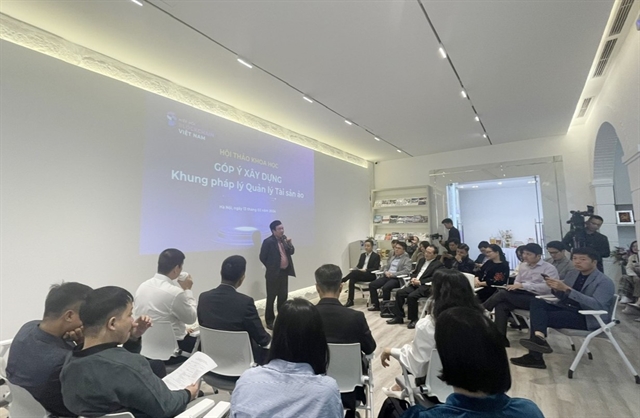 Economy
Economy

 |
| Participants at a workshop on Virtual Assets (VA) and Virtual Assets Service Providers (VASP) in Hà Nội on Wednesday. Photo congthuong.vn |
HÀ NỘI Effective legal frameworks and regulations concerning Virtual Assets (VA) and Virtual Assets Service Providers (VASP) must be developed hand-in-hand with the Vietnamese government's commitment to anti-money-laundering and terrorism financing, heard participants at a workshop on virtual currency and assets yesterday in Hà Nội.
Nguyễn Đoan Hùng, vice chairman of the Vietnam Blockchain Association (VBA) said that both VA and VASP, as well as governmental agencies in Việt Nam, share a common interest in the government's approach to managing activities related to virtual assets.
This has been identified as a top priority by the government in a bid to remove the Southeast Asian country from the Financial Action Task Force's (FATF) grey list. The International Monetary Fund (IMF) estimates that countries on the FATF Gray List are at risk of substantial economic downturns. Việt Nam, added to the Enhanced Monitoring List (Gray List) in June 2023, faces potential reductions in GDP, foreign direct investment (FDI), and other capital flows, according to the IMF.
Consequently, the Ministry of Finance has been tasked with the study and preparation of a legal framework to regulate activities related to VA and VASP within the country and to demonstrate strong legal enforcement efforts, including compliance and measures to address violations, with a deadline in May 2025. This has been made an urgent task as recent surges have sent Bitcoin nearing the US$73,000 mark, the highest price recorded to date since its inception.
Hùng said there are still chances for VASPs operating in the country. However, it will be a long and difficult journey before solutions can be implemented to ensure compliance and safeguard the rights and interests of all stakeholders in the industry.
He said the workshop, the third of its kind organised by the VBA, offered an opportunity for them to voice their opinions and concerns, which will be complied, analysed and sent to various governmental bodies for study on how to build or improve current regulations.
Phan Đức Trung, VBA’s standing chairman, stressed the importance of building legal frameworks to regulate activities related to VA and VASP in Việt Nam in a timely manner. He said some studies have suggested that by 2030, the total value of VAs could account for up to 10 per cent of global GDP, reaching $16 trillion.
"The VBA calls on the VASP community to actively propose solutions and coordinate with regulatory agencies and professional associations in refining the legal basis for VA and VASP; supporting community awareness-raising activities in the private sector; demonstrating compliance; collaborating with implementing units to protect the community's interests against fraud; and paying taxes and proposing taxed solutions to assert the contribution of VA and VASP to the country's economy," he said.
Joe Tu, Global Business Development Director of VASP CoinEx, said while Việt Nam has not recognised VA, VASP CoinEx is committed to fully complying with the country’s regulations, especially those regarding anti-money laundering. CoinEx has demonstrated compliance by pledging support for the ChainTracer fraud detection program initiated by VBA to protect users and minimise the exploitation of blockchain technology for malicious purposes.
Meanwhile, a representative from VASP Remitano, said Remitano is looking forward to legal frameworks in Việt Nam to be in line with global trends.
"Completing the legal framework in a way that creates favourable conditions for VASPs to operate and develop will encourage foreign businesses to invest in Việt Nam, making the country a technology destination in the region," he said.
The workshop was attended by representatives from state management agencies, research organisations, technology companies, financial institutions, legal entities, lawyers both at home and abroad, and members of the community of VASP in Việt Nam. VNS




